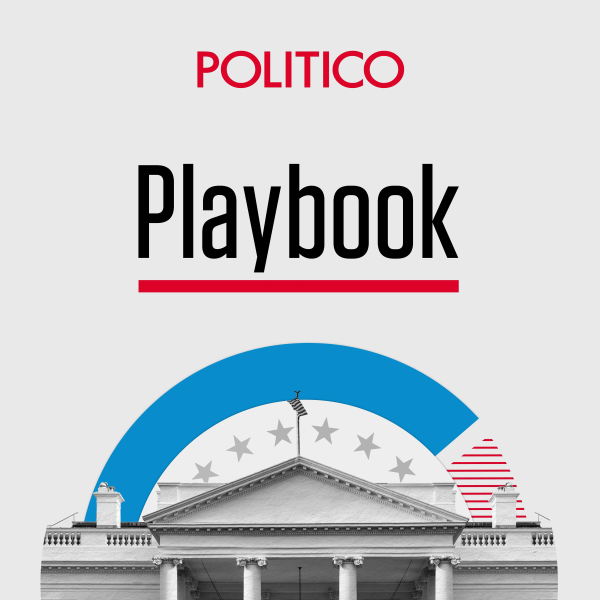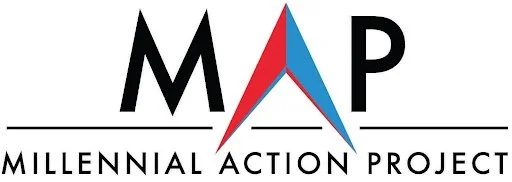The Millennial Action Project (MAP) announces the bipartisan 2022 Criminal Justice Advisory Council, which will be led by Oklahoma State Representative Daniel Pae (R) and Arkansas State Representative Jamie Scott (D).
Youth and expertise converge in gathering of Kansas lawmakers, entrepreneurs
From left, Rebecca Appelgren, Del-Metrius Herron and Rep. Tory Arnberger talk about leadership and their vision for the future during a gathering of young lawmakers and entrepreneurs at Iron Rail Brewery in Topeka. (Sherman Smith/Kansas Reflector)
TOPEKA — Rep. Tory Arnberger-Blew ran for office in 2016 as a student at Fort Hays State University because her legislator never responded to an email.
When he was gone from the Statehouse for three weeks, nobody even noticed.
“My thought is, I just want somebody who’s going to answer the phone, who’s going to answer an email, work for constituent services,” she said. “So that’s why I ran. I filed — he ended up unfiling. I scared him.”
The Great Bend Republican is a member of the bipartisan Kansas Future Caucus, an extension of the D.C.-based Millennial Action Project, which works to engage young policymakers. She joined other members of the caucus and young entrepreneurs in a discussion Wednesday at the Iron Rail Brewery in Topeka.
The goal of the conversation: Bring business leaders and policymakers together to find common ground and figure out how to support each other.
Rebecca Appelgren said health care has changed dramatically since she became an emergency room nurse in 2008. She founded Radiant with Rebecca, a spa and cosmetic service company in Olathe, in 2020.
“People don’t appreciate you saving their life anymore,” Appelgren said. “People want to tell you how to do it, and I learned really quickly that I wasn’t making people happy. I wasn’t happy. I worked through the entire pandemic. It was — it was brutal. It was absolutely brutal.
“And so I finally decided, what do I want to do? How can I make people happy? And that’s kind of what led me into the med spa. I want to build women up. I want to build people up. I want them to feel good about themselves.”
Del-Metrius Herron, a Topeka realtor and leader in a young professionals organization, served as an IT specialist in the U.S. Army National Guard. She returned from Syria after a deployment in 2017-2018 and took a job working long hours.
Then, her son got extremely sick and needed her attention.
“I took a leap of faith,” Herron said. “I quit my job and went into real estate.”
Rep. Rui Xu, a Westwood Democrat, said he entered politics in part because he “didn’t see many people who are like me in politics and elected positions.”
“To a very large extent, in the Statehouse, I represent Asian Americans all across the state,” Xu said. “I take that very seriously, and it’s a big reason why I got involved.”
Patty Markley, a former Republican representative from Overland Park, moderated the discussion. She now works at the Enterprise Center in Johnson County, a nonprofit that helps entrepreneurs access to capital.
Following are excerpts from the discussion.
Del-Metrius Herron, right, says she is “trying to be creative and innovative” with how she works with staff during the pandemic. (Sherman Smith/Kansas Reflector)
When you think about the pandemic, has it forced you to become more innovative or creative?
Herron: My executive assistant, she had a son who had special needs. So I let her work from home because he was high risk. But how do you build culture? How do you train someone as a leader? I’m so used to doing things face to face. She actually resigned from her position, and one of the things we talked about in the exit interview was what are some things I could have done differently as a leader. She wanted more one-on-one time with me. She wanted more development. And I thought I was providing her the flexibility, she was at home, we had connection every day via Zoom, but it still didn’t meet the qualitative needs that she needed. And so I’m trying to be creative and innovative in how do I navigate that space.
Appelgren: We’re losing nurses left and right. Everybody wants out. It’s been a cry for help for a long time. And I have nurses every day asking me, “How are you doing what you’re doing? Like, how can I get out of the bedside?” Instead of one last patient, they take advantage of your integrity, and they give you one more patient, and you end up with never eating, you’re there for 14 hours. And the dynamic of the patients has completely changed. I’ve been spit in the face. I’ve been hit before. It’s not what I went to nursing school, what I thought I was going to do. And so changing through the pandemic was incredibly hard.
Rep. Rui Xu, a Democrat from Westwood, says he represents Asian Americans all across the state and takes that role seriously. (Sherman Smith/Kansas Reflector)
What do you think is the most important aspect of leadership and being a leader in your field?
Xu: This might be a little cynical to say, but I found it very easy to be an average legislator. If I just show up every day and take the right vote for my district, that’s a pretty easy thing to do if you live in a district that matches your politics. If you do that, you’ll probably get reelected. You’ll be OK. But to be really good at it requires kind of an extra level.
Arnberger-Blew: One thing that I think really helped me out is my first session up here, I just listened. I listened. I didn’t speak up watching committee, because I was so scared to ask a dumb question. So scared. But I worked my way in and, being my first year up here, I befriended everybody. My thought is we may disagree on the House floor, but I want to go get dinner with you later, and we can find something that we all agree about.
Herron: Three words come to mind for being a leader in my field. … Integrity, knowledge and I would say advocacy.
Appelgren: In the hospital, I’m always used to cleaning up messes. So trying to be more of a conservative injector, and also knowing the risks and educating my clients.
Rep. Tory Arnberger-Blew and Rep. Rui Xu are co-chairs of the bipartisan Future Caucus, which is supported by the Millennial Action Project. (Sherman Smith/Kansas Reflector)
What do you think are some other incentives that can be given or the state can do better to help young entrepreneurs and also make sure that they stay in Kansas?
Arnberger-Blew: We don’t market ourselves enough. We’re not as appeasing as California, as Texas, as all of those — but why? Why are we not? I think of my great education I had from Fort Hays State University. I loved it so much, I took a victory lap — it took me five years. I knew that I was going to be in Great Bend in western Kansas for the rest of my life. But it’s crazy, when I was when I graduated high school, first thing that everybody said is, “I can’t wait to get out of this place.” … I think that all of us, we need to take a step back and say, how do we bring people back in?
Xu: This is actually something that I learned from the Iowa Future Caucus, that they’re looking at, and it’s essentially a grant to help out rural breweries and distilleries, which I think is a really, really good idea. I spent a very, very hazy weekend in Decorah, Iowa, which is a really cool small town with a really great brewery. And I would have no other reason to visit it. We know that these microbreweries are kind of these new and sexy things that can really bring in a lot of tourism dollars to these smaller towns, especially if it goes along with something — like if they’re along a bike path, or converting a lot of rails to trails.
Rebecca Appelgren says she learned as a nurse in the ICU that it’s better to work smarter, not harder. (Sherman Smith/Kansas Reflector)
What is the key advice you would give someone who wants to start their own business?
Appelgren: There’s a lot of hurdles that you jump through with starting a business. In fact, I’m pretty sure I’ve made lots of mistakes getting to where I’m at. … I learned quickly when I was in the ICU and in the ER, it’s work smarter, not harder.
Herron: I would really tell them that hustle culture is not sustainable. Because I think a lot of times, it’s Instagram, they’re like, “Oh, you gotta go 24/7.” I’ll be honest with you — I killed it last year, but I got sick four times. … I ran my body ragged because I was trying to be all things to all people. And so you have to learn how to optimize, get systems in place.
What would you want your community to know about you? What would you hope that they think of you?
Arnberger-Blew: That I don’t have a resting bitch face.
Appelgren: I can fix that!
Arnberger-Blew: I want them to think that I’m a good person, because politics is so divided, and it’s the same five people that are upset with me. But they’re the loudest. And oh, they hate me! … We’re nice people. We like to have a good time.
Xu: We’re all representing our districts.
Arnberger-Blew: We are. We did a Zoom happy hour with all of us, and it was a blast. And I was like, hey, I do not like anything that you’re saying, but I think you’re a good person.
Xu: The best emails I get are the ones that are like, “Hey, I’m pretty staunch conservative, didn’t vote for you, probably won’t vote for you again, but thanks for helping me with this.” That type of stuff is what means the most.
Herron: I really see myself as a community advocate. I love what I do in the community work, and I feel like I’m in the listening phase right now, but I’m very passionate about our lack of housing, economic inequality, education inequality. And so I want people to know that I’m more than just a sales person. And outside of being a Realtor and community advocate, my favorite role is being a mom.
Appelgren: We had a litter of corgis during the pandemic, and that was so exciting. … The pictures of our corgis brought out so much happiness during the pandemic, and that spoke so deep to me because I thought we can have all these people that feel totally different ways, and we can find a common good and people can be happy. And I take that to my business. … I think that we get distracted so much with so much division that it’s nice to find the corgis in the situation.
Millennial Action Project CEO Layla Zaidane encourages Kansas lawmakers and entrepreneurs to work together on policies during a meeting at the Iron Rail Brewery in Topeka. At left is Rep. Heather Meyer, D-Overland Park. (Sherman Smith/Kansas Reflector)
Commentary: Young people are winning elections. Now what?
Our young elected officials want training to craft and enact good policies for their constituents. We need to make sure they have the resources to get the job done.
Millennials are sweeping into public office: From 2018 to 2020, the United States saw a 266 percent increase in young people running for Congress. In 2021, young people made history with candidates like Nadarius Clark, the youngest Democrat elected to the legislature in Virginia history, and 36-year-old Brandon Umba, a Republican elected to the New Jersey General Assembly. It’s clear from this swell of young people stepping into public service that we are not only ready to shift the political status quo, but we see ourselves as agents of change to do just that. However, to succeed, there’s one thing this generation of elected leaders is missing: professional development.
Kaplan Solutions attributes major benefits to professional development, including increased retention, confidence and credibility, easier succession planning, re-energized staff, and increased efficiency. A recent Gallup report found that 59 percent of millennials say opportunities to learn and grow are extremely important to them when applying for a job. That’s more than any other generation, and legislators are no exception. Freshman members of the House of Representatives are asking for resources that can help them navigate the modern challenges they face. Instead, as Rep. Ilhan Omar shared, “When people are giving you advice, it’s from decades ago as a freshman.”
It’s not always a question of will. In some cases, more senior legislators simply lack the skills that new legislators desperately need to learn. As Congress has become increasingly hyper-polarized, the most visible policymakers are not always the best role models for young leaders. That puts new lawmakers in a tough position: They can either learn bad behaviors from the colleagues they see around them, or they can try to learn how to be an effective policymaker without any support or resources to do so.
In a hearing held by the House Select Committee on the Modernization of Congress, freshmen asked for more robust onboarding and professional development in areas like promoting civility and respect, as well as in leadership training. The committee’s vice chair, Rep. Will Timmons, said in a joint statement with fellow committee member Mary Gay Scanlon, “We came to Congress with different backgrounds but with a similar goal, and that’s to solve problems for the American people. By improving the support, resources, and tools available to new Members of Congress, we can help the next generation of leaders get to work as soon as they set foot in our nation’s capital.” This desire for professional development doesn’t stop with young legislators. Congressional staffers reported similar needs when it comes to investing in their career growth and development. Yet instead of receiving the support they require, these aides — the majority of whom are millennials — are burning out at their jobs and quitting in just 3.1 years.
The outcome of providing more professional development is clear: Our young elected officials and their teams want training to craft and enact good policies for their constituents. The more equipped our leaders are, the more equipped we are to tackle issues important for the future. And the good news is, even though millennials may feel under-equipped for the positions they are taking on today, the tide seems to be turning when it comes to investing in the future. Millennial-run congressional offices have begun advocating for improving pay and benefits, along with securing up-to-date technology, equipment and platforms for their staff.
Millennials are now the largest generation in America, making up the majority of the American workforce, military, consumers and more. They are diving into leadership positions such as CEOs, managers, investors and even members of Congress. As millennials take the reins, our success will ripple across the organizations, industries and institutions that we lead. It’s in everyone’s best interest to make sure that the next generation of leaders has the tools, training and skills to do their jobs well. Young people have taken the first step towards changing our politics for the better. Now we need to make sure they have the resources available to get the job done.
Young people are winning elections. Now what?
POLITICO Playbook PM: Major media moves
Millennial Action Project Announces New Chief Operating Officer
'Reunited States' to have nationwide PBS broadcast premiere
Bipartisanship isn’t dead as Kansas millennial lawmakers walk in Bob Dole’s footsteps
Bad news. Santa’s bringing coal this year. How do we change the story?
Bad news. Santa is bringing coal this year. Lots of it. The International Energy Agency (IEA) expects coal-fired generation to reach a new worldwide record high by the end of 2021. This, of course, is the opposite of what supporters of microgrids want to see. The goal is a cleaner, not dirtier, electric system.
State Rep. Carney Honored as 2021 National ‘Rising Star’ by Millennial Action Project
Last Thursday, Dec. 9, in Washington, D.C., the Millennial Action Project (MAP), the largest nonpartisan organization of Millennial elected officials in the U.S., presented the 2021 Rising Star Award to Connecticut State Rep. Devin Carney (R-23rd) and Arkansas State Rep. Jamie Scott (D). Carney’s District includes the Towns of both Lyme and Old Lyme.
Carney Wins National Award for Bipartisan Leadership
Devin Carney, R-Old Lyme, was one of two state representatives to receive a national 2021 Rising Star award on Friday from the Millennial Action Project, which works to help young leaders bridge the partisan divide.
Young State Lawmakers From Arkansas, Connecticut, and Kansas to Be Awarded for Their Cross-Party Leadership in 2021
Microgrids Powered By Renewable Energy Will Generate Half A Million Jobs & $72 Billion In GDP Growth By 2030
Microgrids Powered by Renewable Energy Will Generate Half a Million Jobs and $72 Billion in GDP Growth By 2030
New Studies Point to Microgrids as ‘Once in a Generation Solution’
Their View: What you can do about US health care
Our health care infrastructure is at stake. Here's what you can do about it.
Beyond Winning and Losing: A New Model for Congressional Training
How millennials and Gen Z are remaking the GOP
While millennials are more progressive and more accepting of government involvement than past generations, they are also not quite as partisan. Layla Zaidane, president of the Millennial Action Project, a nonpartisan organization that works with millennial politicians, says “given all of the ways in which institutions have disappointed and let down millennials and Gen Z, I think we’re more reluctant to identify with even a political party.”
Register young folks to vote. It's for the (political) culture.
Millennial and Generation Z voters are now the largest voting bloc in the United States — we can no longer be pushed to the side on the campaign trail. What's more, getting the younger generation civically engaged may actually be the key to defeating toxic polarization from which our nation is suffering.



























